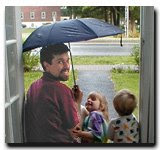Don’t miss the National Solar Home Tour on Saturday, Oct. 4. It’s your chance to see the latest developments in solar technology, up close and personal in your own community. From 9 am to 5 pm, you can visit one of six tours organized by the Maine Solar Energy Association. Homeowners will welcome you into their homes, show off their systems and answer your questions.
In my last column, I discussed solar space heaters, solar hot water systems, and photovoltaic (electricity generating) systems. On the solar tour you’ll have the opportunity to see each of these in action, and learn first-hand how well these technologies work in Maine’s climate. Find out which could be right for you.
As a vendor at Common Ground Fair (speaking of which, kudos to the MOFGA staff and volunteers for a great event!), we had the privilege of talking with hundreds of people about ways to reduce their energy bills.
Two products generated the most excitement. The first was our sturdy Maine drying rack, made from extra thick birch dowels and white pine. Its unique design allows you to dry a full load of laundry — without using any electricity or gas. The second was the SolarSheat space heater. For less than $2,000, you can pump heat into your home or workspace with no fuel costs.
Dudley Greeley, the sustainability coordinator at the University of Southern Maine, dropped by our booth. He’s been helping friends and acquaintances install solar space heaters for years, so it was great to get his perspective. Like me, he’s a big proponent of the technology. On a sunny, crisp, cold winter day in Maine, he says it’s not uncommon for a solar space heater to raise the indoor temperature to 75˚.
Imagine coming home from work to a toasty warm space — with absolutely no guilt because it’s all thanks to FREE solar energy.
Our current financial crisis demonstrates the importance of making prudent investments. Solar space heaters represent one of the best investments available in a heating system. They are clean, safe and dependable. What better deal can you find than getting free heat on every sunny winter day for decades?
But don’t just take my word for it. Take the solar home tour and experience solar energy in action for yourself.
For more information, visit www.FWHorch.com/gogreen.
Fred Horch is the founder of F.W. Horch Sustainable Goods & Supplies in Brunswick, providing practical products and trustworthy advice for sustainable living. Online at www.FWHorch.com.

 ActiveTrax on the Go Audio
ActiveTrax on the Go Audio
 SolarSheat Space Heater The SolarSheat hot air collector is a self-contained and self-powered sustainable solution for space heating. Mounts on a south-facing wall or roof. No need for plumbing or electricity -- these units have a built-in solar-powered fan to blow in warm air whenever there is sun. Now anyone can go solar!
SolarSheat Space Heater The SolarSheat hot air collector is a self-contained and self-powered sustainable solution for space heating. Mounts on a south-facing wall or roof. No need for plumbing or electricity -- these units have a built-in solar-powered fan to blow in warm air whenever there is sun. Now anyone can go solar!













